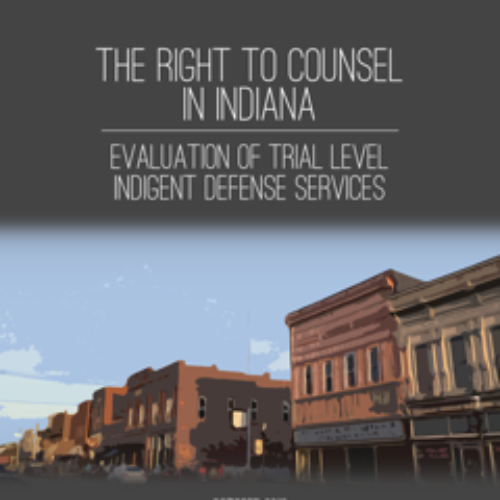Indiana
The state of Indiana delegates to its local governments the responsibility for funding and administering indigent defense services in adult criminal trials, though the state reimburses a portion of the costs through an optional, standards-based reimbursement program. A state commission provides limited oversight of local services.
The state of Indiana delegates to its local governments the responsibility for administering and funding indigent defense services for adult criminal cases in its appellate courts, though the state reimburses a portion of the costs through an optional standards-based reimbursement program. A state commission provides limited oversight of local appellate services.
-
65 Counties Shared State and Locally Funded
-
27 Counties Locally Funded
-
92 Counties Locally Administered
-
65 Counties with a Commission With Limited Authority
-
27 Counties with No State Oversight
-
65 Counties Shared State and Locally Funded
-
27 Counties Locally Funded
-
92 Counties Locally Administered
-
65 Counties with a Commission With Limited Authority
-
27 Counties with No State Oversight
Counties in Indiana are responsible for administering indigent defense services. Public defender offices and private attorneys under contract provide services. Counties are solely responsible for funding misdemeanor representation. For felonies, counties are the primary funders, though they can choose to receive some state reimbursements in exchange for complying with state standards. Depending on available funding, the state may reimburse up to 50% of costs related to capital cases and up to 40% of costs in all other felonies.
The Indiana Commission on Court Appointed Attorneys provides limited oversight of local indigent defense services. Diverse authorities appoint the commission’s eleven members. The commission has standards-setting authority, though those standards apply only to felonies (not misdemeanors) and counties that have opted into the reimbursement program. There are two other state agencies: (1) the Public Defender of Indiana provides representation in post-conviction proceedings, and (2) the Indiana Public Defender Council provides support and training to all indigent defense attorneys in the state. Neither entity provides direct representation in trial-level adult criminal cases.
Counties in Indiana are responsible for administering indigent defense services in all adult appeals. Public defender offices and private attorneys under contract provide services. Counties are solely responsible for funding services in misdemeanor appeals. For felony appeals, counties are the primary funders, though they can receive some state reimbursements in exchange for complying with state standards. Depending on available funding, the state may reimburse up to 50% of costs related to capital cases and up to 40% of costs in all other felonies.
The Indiana Commission on Court Appointed Attorneys provides limited oversight of local indigent defense services. Diverse authorities appoint the commission’s eleven members. The commission has standards-setting authority, though those standards apply only to felonies (not misdemeanors) and counties that have opted into the reimbursement program. There are two other state agencies: (1) the Public Defender of Indiana provides representation in post-conviction proceedings, and (2) the Indiana Public Defender Council provides support and training to all indigent defense attorneys in the state.
Dig Deeper
Who serves on the Indiana Commission on Court Appointed Attorneys?
How do counties opt-in/opt-out of state oversight and reimbursement?
Who appoints the chief public defender heading a county public defender office?
Who selects the private attorneys to provide indigent defense services in a county?
In which branch of state government does the indigent defense system reside?
Support Our Work
Criminal justice issues that disproportionately harm poor people, such as wrongful convictions and over-incarceration, cannot be fixed if indigent defendants are given attorneys who do not have the time, resources, or qualifications, to be a constitutional check on government. Yet, investment in improving indigent defense services remains largely neglected. The Sixth Amendment Center is the only nonprofit organization in the country that exclusively examines, uncovers, and helps fix the root of the indigent defense crisis in which inequality is perpetuated because poor defendants do not get a fair fight.
The Sixth Amendment Center is a tax-exempt 501(c)(3) nonprofit organization under EIN: 45-3477185.
Donations are tax-deductible to the fullest extent allowable under the law.








